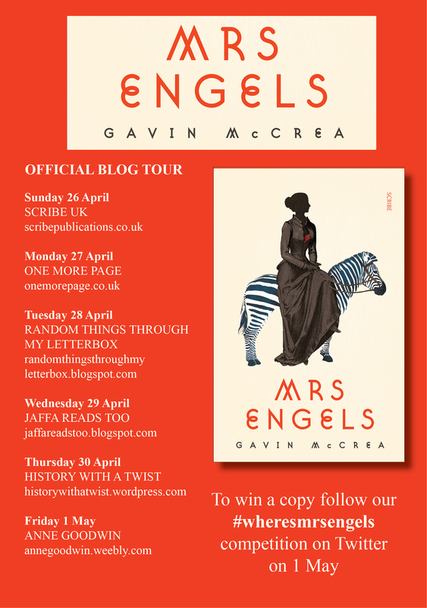| Lizzie Burns is a Manchester millworker, Irish by background, with no family save her hectoring elder sister, Mary. When Mary takes up with the mill owner’s son, Frederick, Lizzie is suspicious. Does Mr Engels genuinely admire the proletariat, or does he have baser instincts in mind? As she later opines (p37): Boys kept like monks by their mothers go one of two ways: they turn womanly or they turn wild. Fredrick’s rearing among the Calvins – kept behind curtains drawn tight and doors too thick for the world’s vices to get in – has done nought for him but disease his head with what it’s been deprived of, and now look at him: single-minded and seeing no ends that aren’t low. He keeps pictures. He makes foreign requests. |
Like Carol Ann Duffy in her poetry collection, The World’s Wife, Gavin McCrea subverts our perceptions of a significant (male) historical figure by portraying him through the eyes of the women close to him. And what a compelling guide Lizzie proves to be, a proud woman, despite her humble beginnings, with a natural intelligence, despite her lack of education, and a lively wit. Most of all, she’s never in awe of her illustrious partner (p104):
‘Blessed be, Frederick, for a man who claims to know the destiny of mankind, you understand diddly-dick about the laws of womenfolk.’
Where the greatest crime is to have your own mind.
Escorting the reader through the streets of Victorian England, from her grand house in Primrose Hill to the ale houses and churches and slums, Lizzie contemplates her own place in the world. And we wonder with her, whether any of the men have the answers: Moss in with the Fenians battling for an independent Ireland while Karl Marx, financed by Engels, sits in his study composing the blueprint for a more egalitarian future.
If you think a novel about the origins of communism might make for a dry read, think again. Having vastly enjoyed it, I was delighted when the author agreed to participate in an annethology debut novelist Q&A, especially when this was incorporated into the launch blog tour. So, enough with my words – pop over now to see what Gavin McCrea has to say about Mrs Engels. He’ll even show you the whiteboard on which he mapped out the novel as he went along. Thanks to Scribe for my review copy – my first, but hopefully not last, from this publisher – and especially to Molly Slight for the logistics. (Note: if you’re reading this in the UK on publication day – 1 May – you can enter the Twitter competition at #wheresmrsengels for a chance to win a free copy.)






















 RSS Feed
RSS Feed





















